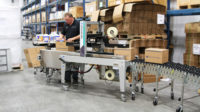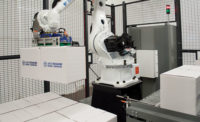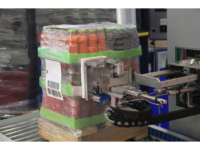Automation
J. Skinner Baking Automation is a Piece of Cake

Schubert’s all-in-one packaging solution combines several process steps. Here the cakes are fed to the pick & place machine via a spiral cooler after decorating or embellishing.
Image courtesy of Gerhard Schubert GmbH
Thanks to a modular machine system, a complex classic dessert is packaged with accuracy and speed.
J. Skinner Baking is one of the largest family-owned bakeries in the United States. The company produces more than 300 million pastries a year, including the popular “Danish strip cakes,” also known as “Danish” in the U.S. The bakery turned to Schubert’s expertise and technology for the automation needed to package its handmade Danish cakes. With the help of the modular machine system, J. Skinner is now able to pack up to 160 Danish in one minute and load them into cartons ready for dispatching using a complete, all-in-one solution.

Image courtesy of Gerhard Schubert GmbH
James Skinner Baking products are distributed at retail and food-service outlets, as well as through co-packing services throughout North America. One of the popular bakery’s specialties is laminated dough, which includes Danish cakes (laminating refers to the art of creating a perfect dough by repeated rolling and folding instead of kneading). This is one reason why J. Skinner, despite the very time-consuming production of an authentic Danish flaky pastry, adheres to its traditional production and does not accept any compromises.
“Although most of our products are made by hand, we are naturally aware of the enormous importance of new automation technologies in the baked goods sector. These play a major role in the continuous improvement of our high product quality,” says David Skinner, managing director at J. Skinner Baking. “An important step has therefore been investment in automation technology for our packaging process.” With Schubert’s solution, the American company has now simplified its existing final packaging processes and placed them in a single packaging line. To this end, the Schubert experts developed a customized solution that could be integrated into the available line without restricting the existing production processes, while ensuring time- and cost-efficient handling of unplanned machine downtimes by integrating a bypass function. Schubert’s all-in-one packaging solution combines several process steps.

Image courtesy of Gerhard Schubert GmbH
First, the removal of the freshly baked products. From the baking sheets in the so-called “depanner” via the subsequent feed to the picker line in which the cakes are picked from the belt and placed into clamshell packaging. The filled clamshells then pass directly from the picker line via feed belts into two identical case packers, where they are packed into the shipping cartons.
From the Washing Cycle to Decoration
The modular complete solution consists of four packaging machines. The baked Danish are fed directly from the oven to the Schubert line. Each baking sheet is stocked with four coffee cakes. The baking sheets are taken into the system by an F2 robot and placed on a stepping chain which transports the trays to the transfer area. There, the Danish are lifted out of the sheets from below by an NC unit and then placed onto the outfeed conveyor by another F2 robot. A third F2 robot transports the emptied sheets to an existing sheet metal washing unit.

Image courtesy of Gerhard Schubert GmbH
After removal from the baking sheets, the cakes are decorated and fed to the Schubert picker line via a spiral cooler. There, a spreading unit separates the cakes for individual quality control before F4 robots place the Danish individually into the clamshells. “This step is not about perfect positioning. In fact, it gives the system a high degree of flexibility and adaptability for future product changes,” explains Julian Conway, sales account manager at Schubert North America. The clamshells containing the Danish are then sealed, labeled and inspected by existing machine equipment before being packed by two Schubert case packers into cartons of various formats ready for dispatching.

Image courtesy of Gerhard Schubert GmbH
Playing it Safe
A unique add-on is the integrated bypass function for removing the Danish from the baking sheets in the event of an unforeseen machine stop. “We hadn’t even thought of such a bypass function when we first presented our ideas and wishes to Schubert. But once Schubert made us aware of the benefits of an integrated bypass system, we immediately recognized the added value,” recalls David Skinner. To avoid a traffic jam of sheets in the future, the system allows the sheets to continue to be conveyed smoothly through the system at a higher level in the machine in the event of a fault.
|
Facts & Figures
|
Looking for a reprint of this article?
From high-res PDFs to custom plaques, order your copy today!






